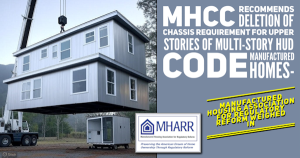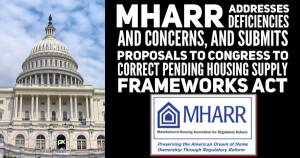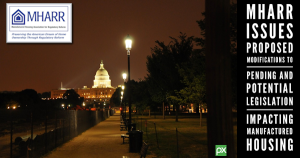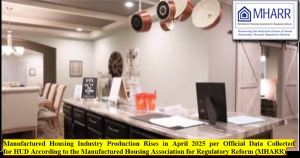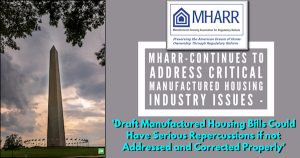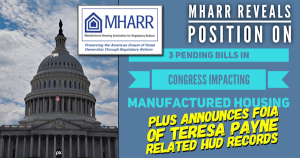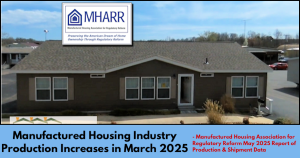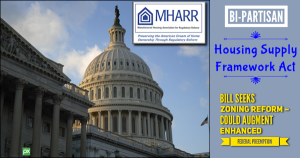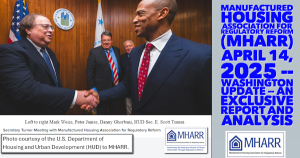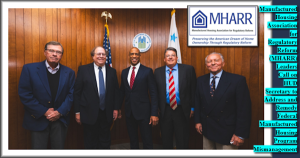“The Duty to Serve — A Cruelly-Unfulfilled Promise and Mandate” MHARR – ISSUES AND PERSPECTIVES AUGUST 2023 by Mark Weiss
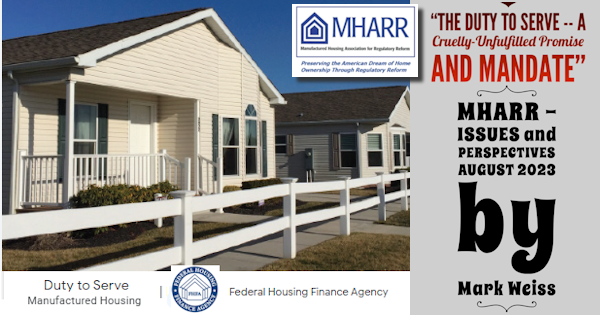
MHARR – ISSUES AND PERSPECTIVES
By Mark Weiss
AUGUST 2023
“THE DUTY TO SERVE — A CRUELLY-UNFULFILLED PROMISE AND MANDATE”
The June 2023 edition of “MHARR – Issues and Perspectives,” addressed one of the two major post-production factors – discriminatory and exclusionary zoning mandates — underlying both the HUD Code manufactured housing industry’s failure to achieve significantly higher levels of production in the face of an ongoing affordable housing crisis and the consistent failure of federal government “affordable housing” grants, funding and other programs to “reach the ground” with respect to HUD Code manufactured housing. The latter phenomenon was examined and documented in MHARR’s July 2022 White Paper, “The Exploitation of Federal Housing Finance and Mortgage Funding Assistance Programs and Potential Solutions.”
With this column, we will address a second major factor which continues to suppress industry growth and the real-world availability of government funding and programs within the HUD Code market (notwithstanding ample growth opportunities for affordable housing) – i.e., the failure of Fannie Mae, Freddie Mac and the Federal Housing Finance Agency (FHFA) to implement the statutory Duty to Serve Underserved Markets (DTS) directive with respect to the nearly 80% of the HUD Code manufactured housing finance market represented by personal property or “chattel” loans.
It is important to recall that the Duty to Serve mandate was included in the Housing and Economic Recovery Act of 2008 (HERA) as a remedy. Specifically, it was made part of HERA and adopted by Congress to remedy the miserable track record of Fannie Mae and Freddie Mac when it came to providing secondary market and securitization support for loans on certain types of affordable homes — including HUD Code manufactured homes — even though their respective charters obligate the Enterprises to promote and provide homeownership opportunities for very low, low and moderate-income American families. DTS thus directs Fannie Mae and Freddie Mac to provide such support for consumer loans within three specified affordable housing markets, one of which is HUD Code manufactured homes. It also designates the Federal Housing Finance Agency (FHFA), the federal regulator for Fannie Mae and Freddie Mac, as the federal agency responsible for ensuring compliance with the DTS mandate – i.e., DTS’ “enforcer.”
It is also important to recall that Congress, when it enacted the DTS mandate, was well aware of the contours of the manufactured housing market and the important role that chattel loans play within that market to provide consumer financing for the industry’s most affordable homes. Based, then, on specific input from MHARR as well as the Manufactured Housing Institute (MHI), Congress included a proviso in the DTS mandate which specifically authorized the inclusion of manufactured home chattel loans within the DTS programs required to be developed and adopted by the two mortgage giants. The statutory DTS mandate, accordingly, embraces, encompasses and includes both manufactured home real estate financing and personal property financing which, again, constitutes the vast bulk of all current-day manufactured housing consumer loans.
So, what have Fannie Mae and Freddie Mac – with FHFA looking on – done with manufactured home chattel loans under DTS? The answer is as succinct as it is devastating. Quite simply, the mortgage giants, with FHFA’s acquiescence, have done exactly nothing under DTS with respect to chattel loans since the mandate’s enactment 15 years ago. Despite false starts, promises and proposals spanning much of the past decade-plus, neither Fannie nor Freddie have ever supported or securitized manufactured home chattel loans under DTS. To be certain, there have been references to chattel loan “pilot programs” in DTS plans proposed by the mortgage entities over that time. And some have even made it to the “approved plan” stage, having been blessed by FHFA, like the Freddie Mac chattel pilot scheduled for the final year of its 2022-2024 DTS “implementation” plan. But, somehow, so far, all of those proposed chattel programs have managed to wash-out prior to implementation.
The odds, therefore, do not favor the current Freddie Mac proposed chattel pilot. Even if it somehow manages to go forward, though, the 1,500 to 2,500 loans currently slated for DTS support (i.e., purchase) would only amount to a marginal fraction (i.e., 1.7% to 2.8%) of the approximately 88,000 manufactured home chattel loans that could be originated in 2023 based on 2022 production levels and the 10-year-plus historical proportion of consumer chattel loans within the manufactured housing market (i.e., 78%) based on U.S. Census Bureau data. Meanwhile, consumers would lose out because roughly 98% of manufactured home consumer chattel loans would still be made at unnecessarily high interest rates (with the lack of DTS support meaning greater retained risk for lenders, combined with a less-than-fully-competitive market), while the industry (and consumers) would continue to suffer from suppressed production levels due to the unavailability or unnecessarily limited availability of fully-competitive, lower interest rate personal property loans. And that is even if the proposed Freddie Mac chattel pilot goes forward. If it does not, 100% of the chattel consumer financing market would continue to be totally unserved.
And how do those real-world impacts play out? For consumers (and potential consumers) it means that chattel loan interest rates for manufactured homes – currently ranging as high as 10.8% for qualified borrowers with lower credit scores (according to publicly available data) –will continue to far exceed mortgage rates for site-built homes, which currently average 7% (again, according to publicly available data). This differential represents a number of factors, including, but not limited to the risk that manufactured home chattel lenders must retain on portfolio because of the lack of any secondary market or securitization for such loans. But it also reflects the market distortion that necessarily flows from a lack of full, or even adequate competition within the chattel financing market (as was acknowledged by Freddie Mac itself in its 2022-2024 DTS Plan). The absence of a functioning secondary market or securitization structure, accordingly, keeps new and additional loan originators out of the market, leaving Berkshire-Hathaway-affiliated 21st Mortgage Corporation (21st) and Vanderbilt Mortgage Corporation (VMC) as the dominant lenders for manufactured home consumer financing in general and chattel loan financing in particular – albeit at unnecessarily high interest rates – thanks to their access to a virtually unlimited supply of capital via the Berkshire Hathaway megalopoly.
For consumers, then, the failure to implement DTS within the manufactured housing chattel market means higher-than-necessary interest rates on purchase loans, fewer potential sources for that financing and, therefore, fewer purchasers who can qualify for the more limited and costly financing that is available. Fannie and Freddie, accordingly, by their failure to implement market-significant chattel market support, are: (1) keeping lower-income qualified consumers out of the manufactured housing market altogether; while (2) driving those that do remain in the market into what some have termed “predatory” loans at needlessly high interest rates. For the HUD Code industry, it means fewer customers and fewer homes produced and sold.
None of this is what Congress intended when it enacted DTS. In fact, Congress’ objective was just the opposite.
Meanwhile, as the affordable housing opportunities provided by HUD Code manufactured housing (documented most recently by a 2023 Harvard University Joint Center for Housing Studies analysis) go underutilized in the midst of an affordable housing crisis, the most damaging effects are being felt by American minority groups. Despite the Biden Administration’s supposed policy emphasis on “equity” in housing and home financing, the homeownership rate among African-Americans (as of 2022) stands at 45.0%, some 4.1% lower than its previous peak in 2004. Similarly, the homeownership rate for Hispanic-Americans remains more than a percentage point below its previous peak of 49.7% in 2007. All of this confirms, again, the findings of MHARR’s July 2022 White Paper, indicating that notwithstanding the billions of dollars in housing programs promoted by the Biden Administration, such funds still fail to “reach the ground” with respect to HUD Code manufactured housing.
So, while HUD wastes billions on affordable housing programs that simply do not work, the answer to the affordable housing crisis (or at least a large part of it) sits right under HUD’s nose in the form of manufactured housing which HUD itself regulates. Why then, does HUD itself not press for the full implementation of DTS? And why is HUD — through the Federal Housing Administration (FHA) — dragging its feet on critically-needed reforms to the FHA Title I manufactured housing program, a program that Ginnie Mae has itself admitted is producing negligible levels of loan originations?
The “problem,” then, is straightforward. There is a lack of housing that is inherently affordable and available to Americans at lower and moderate-income levels. The “solution” to that problem is similarly straightforward. Federally-regulated manufactured housing is the nation’s most affordable source of housing and homeownership, as determined by HUD research. Yet, the “solution” to this national problem is not as broadly available to Americans as it should be or needs to be because of exclusionary zoning, as addressed previously, and because of the failure and outright refusal of Fannie Mae and Freddie Mac to implement DTS within the HUD Code chattel lending sector in defiance of Congress and the law.
So, what can – and should – be done to remedy this defiance? There are many industry organizations and entities which claim to represent and speak on behalf of the individuals, groups and interests that are most directly and grievously harmed by Fannie and Freddie’s blatant refusal to serve the vasty bulk of the manufactured housing consumer lending market under DTS. All of those organizations and entities have a central role to play in bringing maximum pressure on Fannie and Freddie for the full, market-significant implementation of DTS. Unfortunately, as of now, they all have failed. For the sake of the industry and its consumers, this must change and change soon.
MHARR — despite the fact that it does not receive any funding from the industry’s post-production sector – is on record as having done more than any other national group to keep these post-production issues (i.e., discriminatory zoning exclusion and lack of full, market-significant DTS implementation within the consumer chattel financing market) alive and a key public policy focus since the enactment of their relevant enabling laws.
MHI, by contrast, claims to represent the industry’s post-production sector, including finance companies, retailers, suppliers and others. As such – and again, unlike MHARR — MHI collects hefty dues from these businesses in order to effectively address matters impacting the post-production sector, specifically including the availability of consumer financing. Furthermore, MHI, with industry members’ hard-earned dollars, boasts a well-funded Political Action Committee (PAC), as well as funding levels that can support litigation when and if needed.
So, what has MHI done with that funding – particularly with respect to DTS and the lack of consumer loan support within the predominate chattel lending sector? The sad answer is, not much. Much of MHI’s funding appears to be wasted on dead-end show-projects, such as proposed legislation that is likely to go nowhere in the current political environment in Washington, D.C. A good example is MHI’s current “energy” bill (H.R. 3327), that stands a scant chance of going anywhere any time soon. Worse yet, corrective legislation would not even have been necessary had MHI joined with MHARR years ago to force DOE to work with HUD and the Manufactured Housing Consensus Committee (MHCC) on energy standards as required by the original legislation on that subject. Instead, MHI – joining with energy and “climate” special interests – sought and then cooperated with the disastrous DOE “negotiated rulemaking” that helped bring DOE’s egregious energy standards to fruition. MHARR, by contrast, stood alone, casting the only “no” vote on that horrendous proposal.
Instead of such misdirected and most-likely meaningless projects, MHI should demand congressional hearings (as MHARR has already done) regarding the failure of Fannie Mae and Freddie Mac (and in certain respects, FHFA) to fully implement the DTS mandate. As part of such hearings, Fannie and Freddie should be forced to testify and explain, among other things, why they are thumbing their nose at Congress by not implementing the DTS mandate with respect to the vast bulk of the HUD Code manufactured housing financing market.
And what of the self-proclaimed manufactured housing “consumer” groups and organizations, such as MH Action, CFED, turned Prosperity Now, Next Step and others? These groups know full well that Fannie and Freddie have failed to implement DTS for the vast bulk of the manufactured housing consumer finance market and, therefore, for the vast bulk of actual and manufactured housing consumers. Yet, other than paying occasional lip service to the need for DTS chattel lending support, they have done more to: (1) push Fannie and Freddie toward the comparatively small manufactured housing land-home sector; (2) promote more costly manufactured housing real estate hybrids with virtually no market share; and (3) focus on DTS community-related mandates which have little to no positive impact on the availability of affordable manufactured homes, in part because of discriminatory and exclusionary zoning laws as detailed in the June 2023 MHARR Issues and Perspectives.
Instead of such emotionally pleasing yet largely market-inconsequential efforts, these groups – to truly benefit their supposed constituents – should rather join with MHARR and the industry in demanding complete congressional oversight hearings on the failure of Fannie and Freddie to implement DTS for the benefit of the vast bulk of manufactured housing consumers.
Further, what of the individuals and entities that claim to have an interest in the manufactured housing industry, such as MHInsider and ManufacturedHomes.com? While producing written (and other) content related to industry issues, these entities (and others) have largely failed to expose Fannie and Freddie’s defiance of the DTS mandate with regard to consumer chattel loans. Indeed, both have given Fannie and Freddie a platform to tout their purported efforts under DTS, while failing to emphasize that after 15 years, some 80% (or more) of the HUD Code market remains completely unserved.
And what about those who ostensibly stand for the interests of land-lease community owners and operators? Indeed, of the nearly 80% of manufactured home purchasers relying on chattel financing, most make use of the often-cost-efficient ownership model offered by land-lease communities. But where are these supposed representatives, supporters, stalwarts, or others? Who among them have taken HUD, Fannie, Freddie and the others to task for their never-ending failures? Who among them have taken concrete action to demand and pursue actual remedies? At the very least, they must press their national association (MHI) to do much better than it has to date.
The time for standing on the sidelines for all of these groups, organizations and entities, is – and should be – over. After more than a decade and a half, it is time for DTS to be fully implemented. And all should be focused on demanding congressional oversight hearings to stop the defiance of the law by Fannie and Freddie (and others) that has lasted far too long.
Mark Weiss
MHARR is a Washington, D.C.-based national trade association representing the views and interests of independent producers of federally-regulated manufactured housing.
“MHARR-Issues and Perspectives” is available for re-publication in full (i.e., without alteration or substantive modification) without further permission and with proper attribution and/or link back to MHARR.
MHARR – ISSUES AND PERSPECTIVES
By Mark Weiss
AUGUST 2023
“THE DUTY TO SERVE — A CRUELLY-UNFULFILLED PROMISE AND MANDATE”
The June 2023 edition of “MHARR – Issues and Perspectives,” addressed one of the two major post-production factors – discriminatory and exclusionary zoning mandates — underlying both the HUD Code manufactured housing industry’s failure to achieve significantly higher levels of production in the face of an ongoing affordable housing crisis and the consistent failure of federal government “affordable housing” grants, funding and other programs to “reach the ground” with respect to HUD Code manufactured housing. The latter phenomenon was examined and documented in MHARR’s July 2022 White Paper, “The Exploitation of Federal Housing Finance and Mortgage Funding Assistance Programs and Potential Solutions.”
With this column, we will address a second major factor which continues to suppress industry growth and the real-world availability of government funding and programs within the HUD Code market (notwithstanding ample growth opportunities for affordable housing) – i.e., the failure of Fannie Mae, Freddie Mac and the Federal Housing Finance Agency (FHFA) to implement the statutory Duty to Serve Underserved Markets (DTS) directive with respect to the nearly 80% of the HUD Code manufactured housing finance market represented by personal property or “chattel” loans.
It is important to recall that the Duty to Serve mandate was included in the Housing and Economic Recovery Act of 2008 (HERA) as a remedy. Specifically, it was made part of HERA and adopted by Congress to remedy the miserable track record of Fannie Mae and Freddie Mac when it came to providing secondary market and securitization support for loans on certain types of affordable homes — including HUD Code manufactured homes — even though their respective charters obligate the Enterprises to promote and provide homeownership opportunities for very low, low and moderate-income American families. DTS thus directs Fannie Mae and Freddie Mac to provide such support for consumer loans within three specified affordable housing markets, one of which is HUD Code manufactured homes. It also designates the Federal Housing Finance Agency (FHFA), the federal regulator for Fannie Mae and Freddie Mac, as the federal agency responsible for ensuring compliance with the DTS mandate – i.e., DTS’ “enforcer.”
It is also important to recall that Congress, when it enacted the DTS mandate, was well aware of the contours of the manufactured housing market and the important role that chattel loans play within that market to provide consumer financing for the industry’s most affordable homes. Based, then, on specific input from MHARR as well as the Manufactured Housing Institute (MHI), Congress included a proviso in the DTS mandate which specifically authorized the inclusion of manufactured home chattel loans within the DTS programs required to be developed and adopted by the two mortgage giants. The statutory DTS mandate, accordingly, embraces, encompasses and includes both manufactured home real estate financing and personal property financing which, again, constitutes the vast bulk of all current-day manufactured housing consumer loans.
So, what have Fannie Mae and Freddie Mac – with FHFA looking on – done with manufactured home chattel loans under DTS? The answer is as succinct as it is devastating. Quite simply, the mortgage giants, with FHFA’s acquiescence, have done exactly nothing under DTS with respect to chattel loans since the mandate’s enactment 15 years ago. Despite false starts, promises and proposals spanning much of the past decade-plus, neither Fannie nor Freddie have ever supported or securitized manufactured home chattel loans under DTS. To be certain, there have been references to chattel loan “pilot programs” in DTS plans proposed by the mortgage entities over that time. And some have even made it to the “approved plan” stage, having been blessed by FHFA, like the Freddie Mac chattel pilot scheduled for the final year of its 2022-2024 DTS “implementation” plan. But, somehow, so far, all of those proposed chattel programs have managed to wash-out prior to implementation.
The odds, therefore, do not favor the current Freddie Mac proposed chattel pilot. Even if it somehow manages to go forward, though, the 1,500 to 2,500 loans currently slated for DTS support (i.e., purchase) would only amount to a marginal fraction (i.e., 1.7% to 2.8%) of the approximately 88,000 manufactured home chattel loans that could be originated in 2023 based on 2022 production levels and the 10-year-plus historical proportion of consumer chattel loans within the manufactured housing market (i.e., 78%) based on U.S. Census Bureau data. Meanwhile, consumers would lose out because roughly 98% of manufactured home consumer chattel loans would still be made at unnecessarily high interest rates (with the lack of DTS support meaning greater retained risk for lenders, combined with a less-than-fully-competitive market), while the industry (and consumers) would continue to suffer from suppressed production levels due to the unavailability or unnecessarily limited availability of fully-competitive, lower interest rate personal property loans. And that is even if the proposed Freddie Mac chattel pilot goes forward. If it does not, 100% of the chattel consumer financing market would continue to be totally unserved.
And how do those real-world impacts play out? For consumers (and potential consumers) it means that chattel loan interest rates for manufactured homes – currently ranging as high as 10.8% for qualified borrowers with lower credit scores (according to publicly available data) –will continue to far exceed mortgage rates for site-built homes, which currently average 7% (again, according to publicly available data). This differential represents a number of factors, including, but not limited to the risk that manufactured home chattel lenders must retain on portfolio because of the lack of any secondary market or securitization for such loans. But it also reflects the market distortion that necessarily flows from a lack of full, or even adequate competition within the chattel financing market (as was acknowledged by Freddie Mac itself in its 2022-2024 DTS Plan). The absence of a functioning secondary market or securitization structure, accordingly, keeps new and additional loan originators out of the market, leaving Berkshire-Hathaway-affiliated 21st Mortgage Corporation (21st) and Vanderbilt Mortgage Corporation (VMC) as the dominant lenders for manufactured home consumer financing in general and chattel loan financing in particular – albeit at unnecessarily high interest rates – thanks to their access to a virtually unlimited supply of capital via the Berkshire Hathaway megalopoly.
For consumers, then, the failure to implement DTS within the manufactured housing chattel market means higher-than-necessary interest rates on purchase loans, fewer potential sources for that financing and, therefore, fewer purchasers who can qualify for the more limited and costly financing that is available. Fannie and Freddie, accordingly, by their failure to implement market-significant chattel market support, are: (1) keeping lower-income qualified consumers out of the manufactured housing market altogether; while (2) driving those that do remain in the market into what some have termed “predatory” loans at needlessly high interest rates. For the HUD Code industry, it means fewer customers and fewer homes produced and sold.
None of this is what Congress intended when it enacted DTS. In fact, Congress’ objective was just the opposite.
Meanwhile, as the affordable housing opportunities provided by HUD Code manufactured housing (documented most recently by a 2023 Harvard University Joint Center for Housing Studies analysis) go underutilized in the midst of an affordable housing crisis, the most damaging effects are being felt by American minority groups. Despite the Biden Administration’s supposed policy emphasis on “equity” in housing and home financing, the homeownership rate among African-Americans (as of 2022) stands at 45.0%, some 4.1% lower than its previous peak in 2004. Similarly, the homeownership rate for Hispanic-Americans remains more than a percentage point below its previous peak of 49.7% in 2007. All of this confirms, again, the findings of MHARR’s July 2022 White Paper, indicating that notwithstanding the billions of dollars in housing programs promoted by the Biden Administration, such funds still fail to “reach the ground” with respect to HUD Code manufactured housing.
So, while HUD wastes billions on affordable housing programs that simply do not work, the answer to the affordable housing crisis (or at least a large part of it) sits right under HUD’s nose in the form of manufactured housing which HUD itself regulates. Why then, does HUD itself not press for the full implementation of DTS? And why is HUD — through the Federal Housing Administration (FHA) — dragging its feet on critically-needed reforms to the FHA Title I manufactured housing program, a program that Ginnie Mae has itself admitted is producing negligible levels of loan originations?
The “problem,” then, is straightforward. There is a lack of housing that is inherently affordable and available to Americans at lower and moderate-income levels. The “solution” to that problem is similarly straightforward. Federally-regulated manufactured housing is the nation’s most affordable source of housing and homeownership, as determined by HUD research. Yet, the “solution” to this national problem is not as broadly available to Americans as it should be or needs to be because of exclusionary zoning, as addressed previously, and because of the failure and outright refusal of Fannie Mae and Freddie Mac to implement DTS within the HUD Code chattel lending sector in defiance of Congress and the law.
So, what can – and should – be done to remedy this defiance? There are many industry organizations and entities which claim to represent and speak on behalf of the individuals, groups and interests that are most directly and grievously harmed by Fannie and Freddie’s blatant refusal to serve the vasty bulk of the manufactured housing consumer lending market under DTS. All of those organizations and entities have a central role to play in bringing maximum pressure on Fannie and Freddie for the full, market-significant implementation of DTS. Unfortunately, as of now, they all have failed. For the sake of the industry and its consumers, this must change and change soon.
MHARR — despite the fact that it does not receive any funding from the industry’s post-production sector – is on record as having done more than any other national group to keep these post-production issues (i.e., discriminatory zoning exclusion and lack of full, market-significant DTS implementation within the consumer chattel financing market) alive and a key public policy focus since the enactment of their relevant enabling laws.
MHI, by contrast, claims to represent the industry’s post-production sector, including finance companies, retailers, suppliers and others. As such – and again, unlike MHARR — MHI collects hefty dues from these businesses in order to effectively address matters impacting the post-production sector, specifically including the availability of consumer financing. Furthermore, MHI, with industry members’ hard-earned dollars, boasts a well-funded Political Action Committee (PAC), as well as funding levels that can support litigation when and if needed.
So, what has MHI done with that funding – particularly with respect to DTS and the lack of consumer loan support within the predominate chattel lending sector? The sad answer is, not much. Much of MHI’s funding appears to be wasted on dead-end show-projects, such as proposed legislation that is likely to go nowhere in the current political environment in Washington, D.C. A good example is MHI’s current “energy” bill (H.R. 3327), that stands a scant chance of going anywhere any time soon. Worse yet, corrective legislation would not even have been necessary had MHI joined with MHARR years ago to force DOE to work with HUD and the Manufactured Housing Consensus Committee (MHCC) on energy standards as required by the original legislation on that subject. Instead, MHI – joining with energy and “climate” special interests – sought and then cooperated with the disastrous DOE “negotiated rulemaking” that helped bring DOE’s egregious energy standards to fruition. MHARR, by contrast, stood alone, casting the only “no” vote on that horrendous proposal.
Instead of such misdirected and most-likely meaningless projects, MHI should demand congressional hearings (as MHARR has already done) regarding the failure of Fannie Mae and Freddie Mac (and in certain respects, FHFA) to fully implement the DTS mandate. As part of such hearings, Fannie and Freddie should be forced to testify and explain, among other things, why they are thumbing their nose at Congress by not implementing the DTS mandate with respect to the vast bulk of the HUD Code manufactured housing financing market.
And what of the self-proclaimed manufactured housing “consumer” groups and organizations, such as MH Action, CFED, turned Prosperity Now, Next Step and others? These groups know full well that Fannie and Freddie have failed to implement DTS for the vast bulk of the manufactured housing consumer finance market and, therefore, for the vast bulk of actual and manufactured housing consumers. Yet, other than paying occasional lip service to the need for DTS chattel lending support, they have done more to: (1) push Fannie and Freddie toward the comparatively small manufactured housing land-home sector; (2) promote more costly manufactured housing real estate hybrids with virtually no market share; and (3) focus on DTS community-related mandates which have little to no positive impact on the availability of affordable manufactured homes, in part because of discriminatory and exclusionary zoning laws as detailed in the June 2023 MHARR Issues and Perspectives.
Instead of such emotionally pleasing yet largely market-inconsequential efforts, these groups – to truly benefit their supposed constituents – should rather join with MHARR and the industry in demanding complete congressional oversight hearings on the failure of Fannie and Freddie to implement DTS for the benefit of the vast bulk of manufactured housing consumers.
Further, what of the individuals and entities that claim to have an interest in the manufactured housing industry, such as MHInsider and ManufacturedHomes.com? While producing written (and other) content related to industry issues, these entities (and others) have largely failed to expose Fannie and Freddie’s defiance of the DTS mandate with regard to consumer chattel loans. Indeed, both have given Fannie and Freddie a platform to tout their purported efforts under DTS, while failing to emphasize that after 15 years, some 80% (or more) of the HUD Code market remains completely unserved.
And what about those who ostensibly stand for the interests of land-lease community owners and operators? Indeed, of the nearly 80% of manufactured home purchasers relying on chattel financing, most make use of the often-cost-efficient ownership model offered by land-lease communities. But where are these supposed representatives, supporters, stalwarts, or others? Who among them have taken HUD, Fannie, Freddie and the others to task for their never-ending failures? Who among them have taken concrete action to demand and pursue actual remedies? At the very least, they must press their national association (MHI) to do much better than it has to date.
The time for standing on the sidelines for all of these groups, organizations and entities, is – and should be – over. After more than a decade and a half, it is time for DTS to be fully implemented. And all should be focused on demanding congressional oversight hearings to stop the defiance of the law by Fannie and Freddie (and others) that has lasted far too long.
Mark Weiss
MHARR is a Washington, D.C.-based national trade association representing the views and interests of independent producers of federally-regulated manufactured housing.

